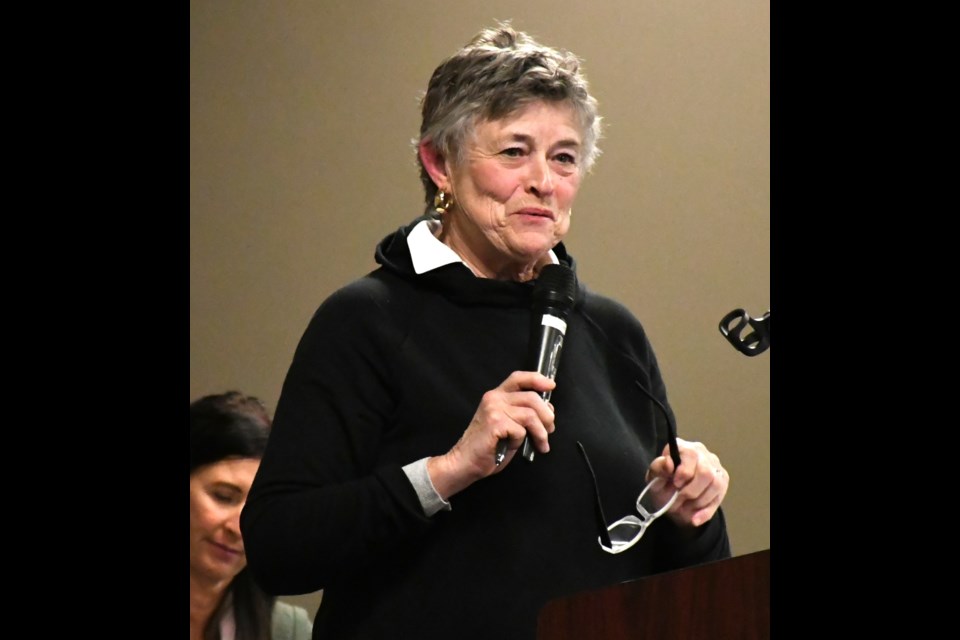MOOSEJAWTODAY.COM — Rural resident Wilda Soper says there are many unanswered questions about the proposed landfill location and believes the current engagement process has failed ratepayers in the rural municipality.
Soper was one of more than 60 people who attended the , which will help the organization determine whether it should approve or reject the City of Moose Jaw’s discretionary use application for a solid waste management venue north of the city.
Soper — vehemently opposed to the location since it’s adjacent to her homestead — was fired up all evening, including during her presentation and when city officials spoke, where she interrupted them with additional questions.
RM Reeve Ron Brumwell was forced to silence Soper by saying the forum was not about debating the issue but about receiving information — including from city officials.
City manager Maryse Carmichael, operations director Bevan Harlton and an engineering consultant also spoke; their comments are in another article. During those presentations, many attendees could be heard muttering negatively about the answers they heard.
Unanswered questions
A rural ratepayers’ group has not received honest answers from city hall about the site since the group believes the municipality will eventually move more services — such as transit and public works — out there, Soper said.
She referred to several articles in the Moose Jaw Express with comments from Harlton about the site, comments she believes reveal city hall’s true intentions.
Furthermore, when the group met with officials, Soper said she asked Harlton whether the city works complex could move to the new location. He said yes, while Carmichael said that “it was a possibility.”
During another encounter, Soper said she asked Harlton whether the city would move its bus garage there; he replied yes. However, during the city’s landfill-related open house on Feb. 22, he allegedly told her that he didn’t recall saying that.
“I think it’s only fair that if they are considering moving that (city complex) out, then our RM (and the Ministry of Highways) should know now … ,” Soper said.
A second question Soper had was about the city’s “Plan B” if the RM council rejected the application and whether it would expropriate or annex land.
Soper stated that while she isn’t an engineer, she is a farmer, mother and grandmother of future farmers.
“That is my dream. I think it’s a dream worth fighting for,” she said. “Common sense and logic say, you do not put a dump on prime, agricultural land … . We should be fighting like hell to protect and preserve it.”
Since Soper thought the city had ignored and neglected rural residents’ rights, she wanted the RM to reject the “ridiculous proposal” and have the city choose a different site or approach to handling waste.
“We need to take care of the future today,” she added.
Soper later told the Express that from the site’s 390 acres, if each acre yielded 44 bushels, each could annually produce 1,404,000 loaves of bread or 294,840 kilograms (655,200 pounds) of pasta.
Not on my land
During his presentation, Cal Soper, Wilda’s son, read parts of the RM’s zoning bylaw and contrasted them with the proposed project. His main point was the latter failed to meet the criteria of the former. Moreover, he wondered how the RM council could approve the project when the city had only provided a draft design.
Meanwhile, he said there would be many health and safety risks, while farmers would face delays moving their machines if Highway 2 was perpetually busy. It would also affect his kids’ ability to ride their bikes on grid roads, while it would generate additional noise and traffic.
The Sopers’ home quarter section is across from the proposed venue, and he wants to build a new home on that section, although that’s unlikely to happen now, while they likely can’t subdivide either, he said.
The rural resident listed his other concerns, including the fact that while the city will use a berm to block water from running through the site, that would flood area farmland. He also wondered who would collect the garbage from his property.
“They definitely will not be walking through my fields, tramping down my crops … . And (they) will not be driving through my land in the spring, fall or winter transferring diseases to my land,” Soper said.
The young farmer thought city hall had done a “poor” job of communicating or providing honest answers.
He also thought there had been no transparency, that this project did not provide good value for money, and that it would not sequester carbon or provide food — all criteria, he noted, that the city’s still-draft Official Community Plan and zoning bylaw stipulate.
“It is my firm belief that there is no reason to approve this discretionary use application. We have been kept in the dark in this whole process, lied to, and information has been kept secret (from us) … ,” he said. “This whole project is full of lies and deception.”
Soper added that city hall had 12 years to put together a proposal, but the RM council and ratepayers were still waiting for further information about the project.




